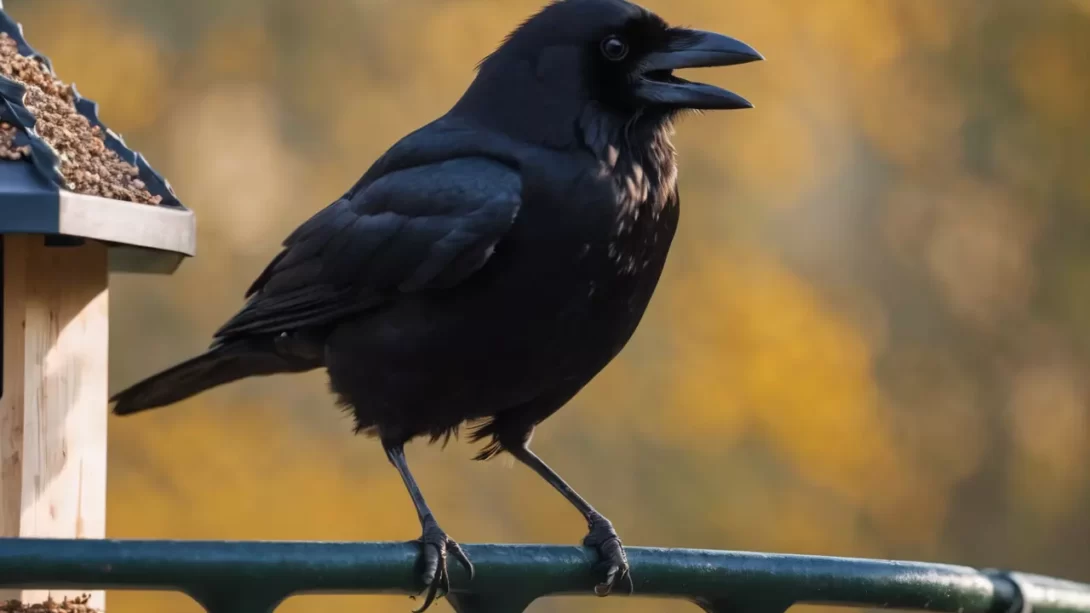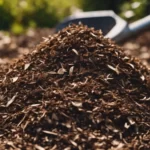Crows, while intelligent and fascinating birds, can dominate bird feeders, often at the expense of smaller species. Their size, appetite, and group feeding habits can quickly deplete bird food supplies and discourage other birds. Finding humane and effective ways to deter crows can help maintain a more balanced and diverse backyard bird population.
Crows
Crows are highly intelligent and adaptable birds, known for their problem-solving skills. This intelligence, combined with their size and social nature, often leads them to congregate at food sources like bird feeders. Understanding these aspects of crow behavior is crucial in developing effective deterrent strategies.
Feeder Selection and Placement
Choosing and placing bird feeders thoughtfully can make a significant difference:
- Feeder Type: Opt for feeders designed for smaller birds, such as tube feeders with short perches or weight-sensitive feeders that close under the weight of a crow.
- Placement: Position feeders close to shrubs or trees where smaller birds can quickly take refuge. Crows are less likely to venture into areas where they cannot easily escape.
Modifying Feed Choices
Altering the type of feed you use can also discourage crows:
- Less Appealing Food: Crows are less attracted to nyjer and safflower seeds, which are preferred by many smaller birds.
- Avoid Large Seed Mixes: Steer clear of mixes that contain large grains or nuts, which are favorites of crows.
Use of Deterrents
Visual Deterrents
Visual deterrents can be effective in scaring crows away:
- Reflective Objects: Hang reflective tapes, CDs, or even old aluminum pie plates around the feeder area. The light reflections and movement can deter crows.
- Scarecrows: A well-placed scarecrow, especially one that’s moved regularly, can keep crows at bay.
Auditory Deterrents
Noise can be used to startle and deter crows:
- Noise Devices: Devices that produce occasional loud noises or distress calls of predatory birds can discourage crows from approaching.
Physical Barriers
Creating physical obstacles can prevent crow access:
- Feeder Guards: Install guards or cages around bird feeders that allow smaller birds in but keep larger birds out.
Creating an Unwelcoming Environment
Making your yard less hospitable to crows can encourage them to move on:
- Remove Attractions: Ensure that other potential food sources, like open garbage bins or pet food, are not accessible.
- Limit Water Sources: Large birdbaths can attract crows, so consider smaller, shallow water sources that cater more to small birds.
Attracting Natural Crow Predators
Encouraging the presence of natural predators can help in controlling crow populations:
- Raptors: Creating an environment that is attractive to birds of prey, such as hawks, can naturally reduce the number of crows in your area.
While crows are an intelligent and interesting part of the avian world, their dominance at bird feeders can be problematic. By employing a combination of strategic feeder placement, altering feed types, using deterrents, and creating an environment less inviting to crows, you can encourage a more diverse range of birds to visit your feeders. Remember, patience and consistency are key, as crows are quick to learn and adapt.
Regular Cleaning and Maintenance
Regular upkeep of bird feeders is essential in deterring crows:
- Clean Feeders: Keep bird feeders clean to prevent large seed buildups that might attract crows.
- Rotate Feeders: Regularly change the location of your bird feeders to prevent crows from establishing a feeding routine.
Legal and Ethical Considerations
When implementing crow deterrent strategies, it’s important to stay informed about wildlife laws:
- Compliance with Laws: Ensure all deterrent methods are legal in your area and do not harm the crows or other wildlife.
- Humane Methods: Focus on deterrence and habitat modification rather than harmful tactics.
Monitoring and Adjusting Strategies
Adaptability is key in effectively keeping crows away from bird feeders:
- Observation: Regularly observe the behavior of crows around your feeders to identify which deterrents are most effective.
- Strategy Adjustment: Be prepared to adjust your strategies, as crows are intelligent and may become accustomed to certain deterrents over time.
Conclusion
Successfully keeping crows away from bird feeders requires a combination of thoughtful feeder placement, food choice, use of deterrents, and creating an unwelcoming environment for them. Regular maintenance, coupled with an understanding of crow behavior, allows for a more peaceful coexistence with these intelligent birds. While it can be challenging, remember that the goal is to encourage a diverse bird population in your backyard. Patience, persistence, and a willingness to try different approaches are essential in achieving this balance.



